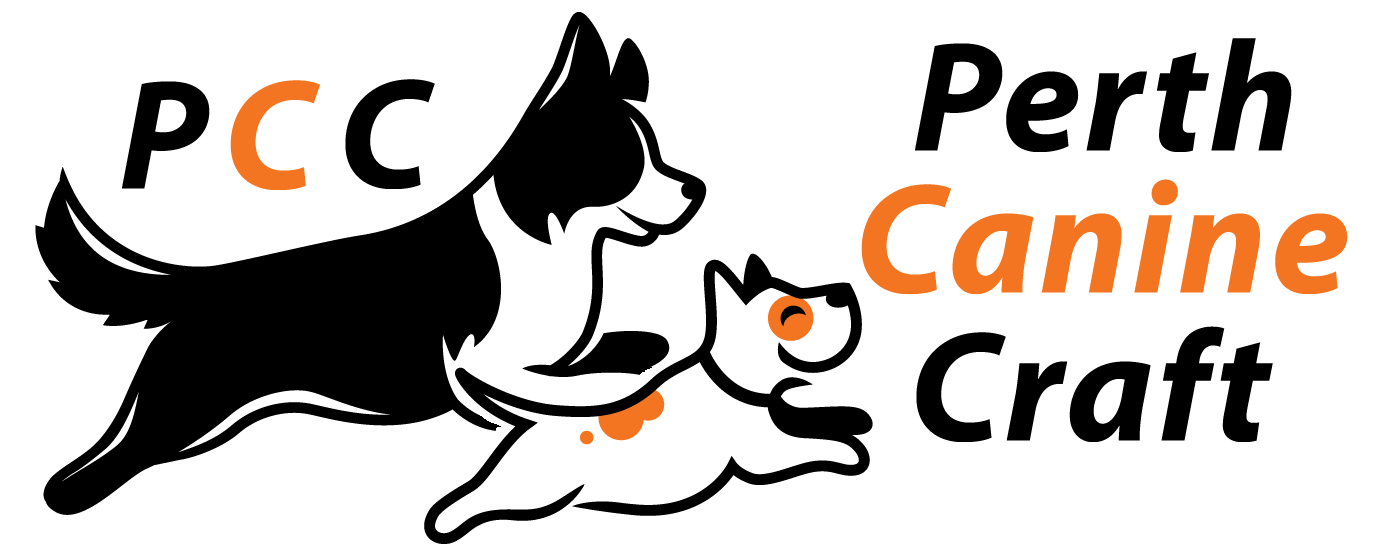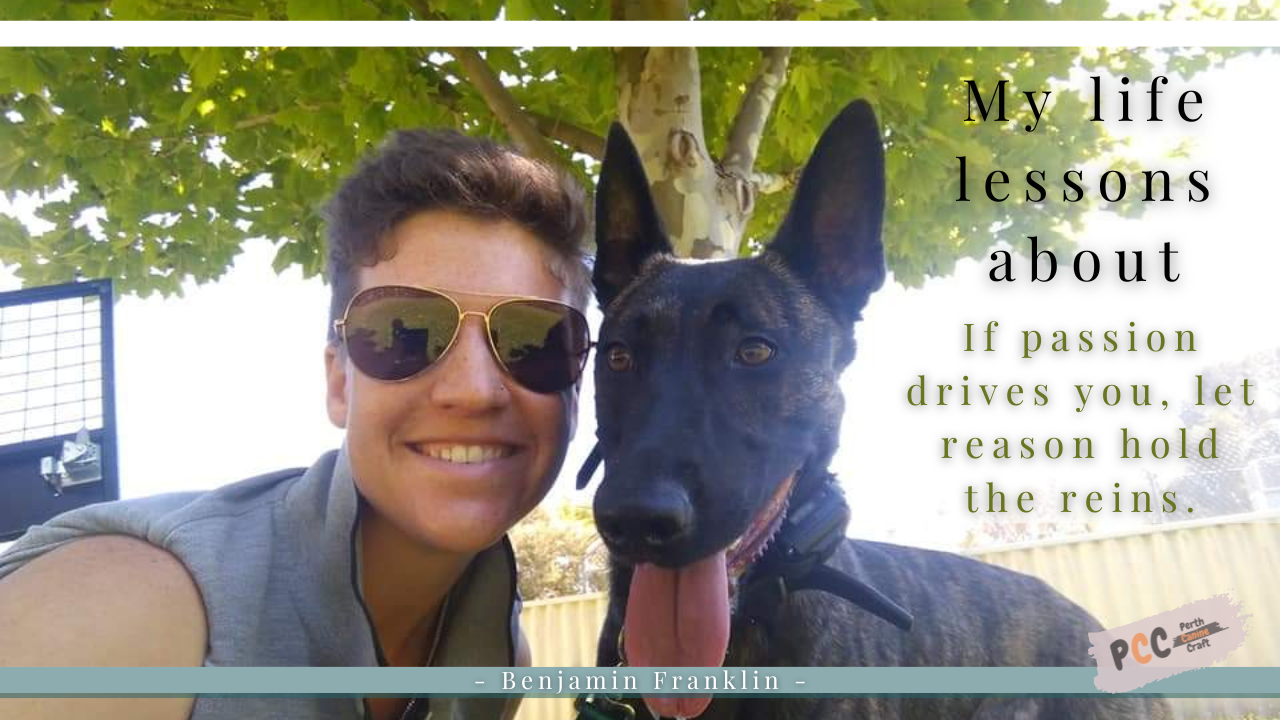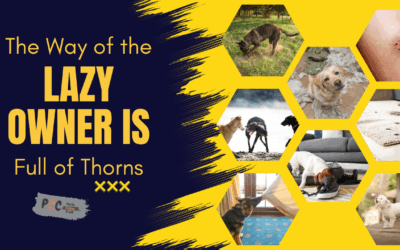Benjamin Franklin – If passion drives you, let reason hold the reins.
In the vibrant world of dog training, emotions often surge as trainers and their clients embark on a shared quest for improvement and companionship. It’s crucial to recognize that in this journey, the dog’s owners play a pivotal role in shaping their dog’s behaviour and well-being. Just as in human interactions, understanding the delicate interplay of shame and guilt is essential for creating an environment where clients feel empowered to overcome challenges while achieving tangible results. Inspired by the timeless wisdom of Benjamin Franklin, who advised, “If passion drives you, let reason hold the reins,” let’s delve into how we can navigate the complexities of dog training, balancing passion with reason for optimal outcomes.
Just to create some clarity for the following, I need you to understand how I use the terms dog trainer and dog owner coach (often referred to as dog instructor). What I mean when I say dog trainer is that I am the one training the dog. When I say dog owner coach, I mean I am coaching an owner to train their own dog.
The difference between shame and guilt
The Significance of Dog Owners in Training:
In the realm of dog training, the partnership between dog owner coaches and their clients is paramount. While dog trainers bring expertise and guidance as coaches, dog owners hold the key to implementing strategies and fostering lasting change in their dog’s behaviour. Understanding the unique dynamics of this relationship lays the groundwork for effective training and achievable outcomes. I always tell my clients the following:
“You need to understand the formula to this being successful = what works for the dog + what the owners do. After all, it is no skin off my nose, I don’t live with your dog nor do I have the legal responsibility for your dog. I have learnt to only be as invested as much as the human end of the leash, otherwise, I will be burnt out, have compassion fatigue and put the responsibility on my shoulders that is not my burden to carry”
As a dog owner coach, understanding the difference between shame and guilt can be instrumental in helping your clients navigate the training process effectively, which ultimately benefits their dogs. Here’s an example scenario illustrating how you might utilize this knowledge:
Imagine you’re working with a client named Sarah who has been struggling with consistency in reinforcing commands with her dog, Bailey. During a training session, Bailey repeatedly fails to follow basic commands, leading Sarah to express frustration and self-criticism. Recognizing that Sarah is experiencing emotions that may hinder her progress, you initiate a conversation to explore her feelings further.
Instead of focusing solely on Bailey’s behaviour, you gently inquire about Sarah’s emotional response to the situation. Through empathetic listening and guidance, you help Sarah identify that she’s feeling a mix of shame and guilt. She feels ashamed because she believes she’s failing as a dog owner, and guilty for not being consistent in training Bailey effectively.
Using this understanding, you frame the conversation around the difference between shame and guilt. You explain that while shame revolves around a sense of intrinsic unworthiness, guilt is focused on specific behaviours or actions. By helping Sarah distinguish between the two emotions, you empower her to recognize that her feelings of guilt are constructive—they signal an opportunity for growth and improvement in her training approach.
You work collaboratively with Sarah to set achievable goals and develop practical strategies for reinforcing positive behaviours in Bailey. Together, you create a training plan that emphasizes consistency, positive reinforcement, and patience. By reframing her emotions from shame to guilt, Sarah becomes more motivated to take proactive steps to address her training challenges.
As Sarah implements the training techniques discussed, she begins to see improvements in Bailey’s behaviour and their relationship strengthens. With your guidance and support, Sarah gains confidence as a dog owner and learns to approach training with a balanced mix of passion and reason. Through this process, both Sarah and Bailey benefit, leading to a harmonious and fulfilling companionship.
In this example, understanding the difference between shame and guilt enables you to support your client effectively, ultimately leading to positive outcomes for both the client and their dog. By fostering a supportive environment and promoting emotional awareness, you empower your clients to overcome challenges and build stronger bonds with their furry companions.
Embracing Shame and Guilt: Catalysts for Growth:
Shame and guilt, though often viewed negatively, can serve as powerful catalysts for growth and improvement. As a dog owner coach, it’s essential to recognize the potential impact of these emotions on both clients and their pets. By fostering an environment where shame is replaced by guilt (accountability and introspection), we empower clients to navigate challenges with resilience and determination.
As a dog trainer, my journey with my dogs has been a profound learning experience, particularly in understanding the difference between shame and guilt. It was 2 specific dogs, Ziva (2019-2020) and Reaper (2013-2016), who served as my teachers, guiding me through this transformative process. Now, with my current dog Kai, I’m putting these invaluable lessons into practice every day.
Reflecting on my experiences with Ziva and Reaper, I recall moments of frustration and self-doubt during training sessions. At times, I found myself overwhelmed by a sense of inadequacy and unworthiness, unsure of how to navigate the challenges before me. I often found myself thinking: “If would have been better if another trainer had these dogs“. However, it was through these struggles that I began to distinguish between shame and guilt and understand their profound impact on my training approach.
Ziva and Reaper taught me that shame, with its focus on intrinsic unworthiness, only served to hinder my progress, and in turn theirs as well. It led me to doubt my abilities and prevented me from seeking the help and guidance I needed to succeed. Recognizing the destructive nature of shame, I made a conscious decision to replace it with guilt—a more constructive emotion that motivated me to take responsibility for my actions and seek solutions to improve my training methods.
With the support of mentors and a newfound awareness of the power of guilt, I implemented positive changes in my training approach. By embracing guilt as a catalyst for growth and learning from my mistakes, I transformed my relationship with Ziva and Reaper, achieving greater success in our training endeavours.
Now, with Kai by my side, I continue to put these lessons into practice. Each day presents new opportunities for growth and learning, and I approach our training sessions with a renewed sense of confidence and determination. Inspired by the journey I’ve travelled with Ziva and Reaper, I’m committed to helping others navigate their own training challenges, empowering them to embrace guilt as a force for positive change in their relationships with their furry companions.
Together, Kai and I embark on our training journey with open hearts and minds, knowing that with the right mindset and approach, anything is possible. As we strive for progress, we honour the memory of Ziva and Reaper, whose lessons continue to guide us on this path of growth and connection.
When my Passion overcomes my Reason
Passion is the intense emotional drive or enthusiasm we feel towards something, be it a hobby, career, or cause. It’s characterized by strong emotions, deep commitment, and a sense of purpose. Passion fuels our interests and motivates us to invest time, energy, and resources into pursuits that bring us joy, fulfilment, or meaning.
On the other hand, reason refers to the ability to think logically, analyze information, and make informed decisions based on evidence and rational thought. Reason involves critical thinking, problem-solving, and weighing the pros and cons of different options. It helps us navigate complex situations, anticipate consequences, and make choices that align with our goals and values.
When passion overwhelms reason in my role as a dog owner coach, it can lead to devastating effects on my clients and their dogs. Passion, while essential for driving motivation and enthusiasm, must be balanced with reason to ensure responsible and effective coaching practices. When passion overtakes reason, several negative consequences may arise:
- Unrealistic Expectations: Passion-driven coaching may lead to setting unrealistic expectations for clients and their dogs. I may become overly optimistic about the speed and ease of progress, failing to account for individual differences in learning styles, behaviours, and challenges. This can leave clients feeling frustrated, discouraged, and disillusioned when they fail to meet lofty goals.
- Lack of Flexibility: An excessive focus on passion may result in inflexibility in coaching methods and approaches. I may become rigid in my beliefs and unwilling to adapt strategies based on the unique needs and circumstances of each client and dog. This lack of flexibility can hinder progress and limit the effectiveness of coaching interventions.
- Neglect of Core Principles: Passion-driven coaching may cause me to overlook fundamental principles of dog training and behavior modification. In my zeal to achieve quick results or pursue personal interests, I may neglect essential aspects such as positive reinforcement, consistency, and humane treatment. This can lead to confusion, frustration, and even harm for clients and their dogs.
- Overwhelming Pressure: When passion overrides reason, I may inadvertently place undue pressure on clients to meet my expectations or conform to my methods. This can create a stressful and intimidating environment that undermines trust, collaboration, and communication between coach and client. Clients may feel overwhelmed, anxious, and inadequate, further impeding their ability to learn and succeed.
- Burnout and Exhaustion: Excessive passion without a balanced approach can also lead to burnout and exhaustion for both myself and my clients. I may push myself and my clients too hard, leading to feelings of overwhelm, fatigue, and disillusionment. This can erode motivation, enthusiasm, and commitment, ultimately hindering progress and causing disengagement.
Overall, when passion overwhelms reason in my role as a dog owner coach, the consequences can be profound and detrimental to the well-being and success of my clients and their dogs. It’s essential to maintain a balanced approach that integrates passion with reason, ensuring responsible, effective, and sustainable coaching practices that prioritize the welfare and happiness of all involved.
While passion is a driving force in my role as a dog owner coach, it must be tempered with reason to ensure realistic and practical outcomes for my clients and their dogs. When passion overwhelms reason, the effects can be devastating, leading to unrealistic expectations, inflexibility, neglect of core principles, overwhelming pressure, and burnout. By maintaining a balanced approach that integrates passion with reason, I can provide responsible, effective, and sustainable coaching practices that prioritize the well-being and success of all involved. Striking this balance requires ongoing reflection, self-awareness, and a commitment to continual learning and growth. Ultimately, by harnessing the power of both passion and reason, I can create a supportive and empowering coaching environment where clients and their dogs can thrive and reach their full potential.
Do you have any areas where your passion is overriding your reason and having bad effects on your client’s outcomes?





0 Comments